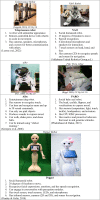Use of a Humanoid Robot in Supporting Dementia Care: A Qualitative Analysis
- PMID: 37324571
- PMCID: PMC10265350
- DOI: 10.1177/23779608231179528
Use of a Humanoid Robot in Supporting Dementia Care: A Qualitative Analysis
Abstract
Introduction: Cognitive impairment significantly affects independence in persons with dementia, and consistent supervision is often needed. While interest has arisen in using humanoid robots, such as Pepper, to assist with daily caregiving activities, little is known about the perceptions of using Pepper to assist people with dementia.
Objective: This study aimed to explore the perceptions of nonhealthcare workers, care partners, and healthcare workers on the use of a Pepper robot in dementia care.
Methods: This was a secondary qualitative analysis. Data were collected from a pilot study conducted from November 2020 to March 2021 using an online survey. The survey consisted of quantitative and qualitative questions; this study only focused on the qualitative responses. The detailed procedures and the quantitative results were published elsewhere. Participants included nonhealthcare workers, care partners, and healthcare workers.
Results: A total of 194 participants responded to the open-ended question. Participants described potential benefits of Pepper including assisting with daily activities, monitoring safety and medication use, initiating reminders, and promoting activities and social interactions. Participants had concerns about privacy, cost, poor acceptance/trust, Pepper making mistakes, limitations in environmental navigation and responding to emergencies, misuse of Pepper, and Pepper replacing humans. Participants suggested that Pepper should be tailored to each individual's background, preferences, and functions and recommended improving the logistics of using Pepper, offering more emotional support and responses, and using a more natural appearance and voice.
Conclusion: Pepper may support dementia care; yet some concerns need to be addressed. Future research should consider incorporating these comments when designing robots for dementia care.
Keywords: Alzheimer's; dementia; humanoid social robot; pepper; perception.
© The Author(s) 2023.
Conflict of interest statement
The author(s) declared no potential conflicts of interest with respect to the research, authorship, and/or publication of this article.
References
-
- Abbott R., Orr N., McGill P., Whear R., Bethel A., Garside R., Stein K., Thompson-Coon J. (2019). How do “robopets” impact the health and well-being of residents in care homes? A systematic review of qualitative and quantitative evidence. International Journal of Older People Nursing, 14(3), e12239–n/a. 10.1111/opn.12239 - DOI - PMC - PubMed
-
- Adam A. (2018, May 6). Meet pepper – Canada’s first emotionally sensitive robot for sick kids .Global News. https://globalnews.ca/news/4180025/pepper-canada-robot/
-
- Aldebaran United Robotics Group. (n.d.). NAO . https://www.aldebaran.com/en/nao
-
- Alzheimer’s Association. (n.d.). Stages of Alzheimer’s . https://www.alz.org/alzheimers-dementia/stages
LinkOut - more resources
Full Text Sources

